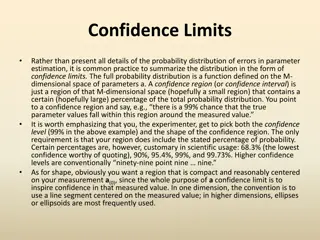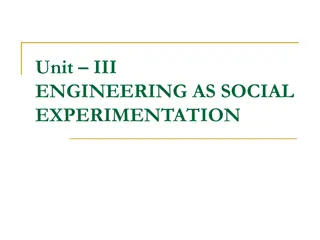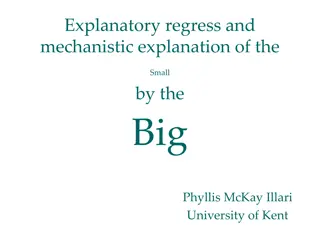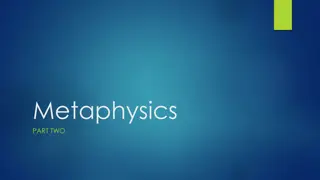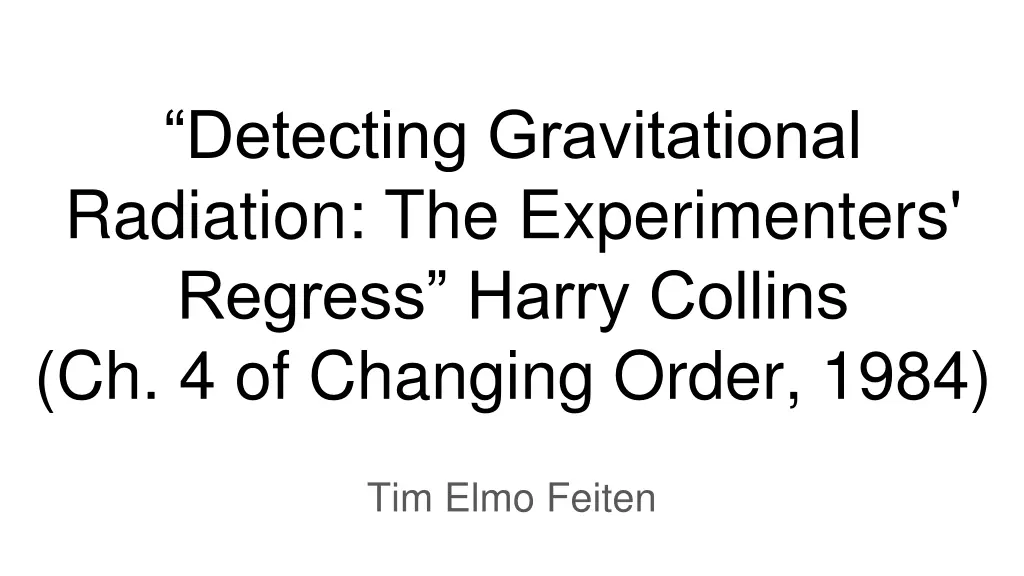
Experimenters' Regress: Detecting Gravitational Radiation Insights
Delve into Harry Collins' examination of detecting gravitational radiation, exploring the Weber Bar's role, challenges faced in detecting gravitational waves, and the innovative approaches taken. The analysis encompasses the skepticism, experimental replications, and the profound impact on scientific beliefs, offering a rich understanding of the complexities involved in such endeavors.
Download Presentation

Please find below an Image/Link to download the presentation.
The content on the website is provided AS IS for your information and personal use only. It may not be sold, licensed, or shared on other websites without obtaining consent from the author. If you encounter any issues during the download, it is possible that the publisher has removed the file from their server.
You are allowed to download the files provided on this website for personal or commercial use, subject to the condition that they are used lawfully. All files are the property of their respective owners.
The content on the website is provided AS IS for your information and personal use only. It may not be sold, licensed, or shared on other websites without obtaining consent from the author.
E N D
Presentation Transcript
Detecting Gravitational Radiation: The Experimenters' Regress Harry Collins (Ch. 4 of Changing Order, 1984) Tim Elmo Feiten
The Author: Harry Collins - Professor of Social Sciences at Cardiff University key member of the Bath School in Sociology of Scien- tific Knowledge (SSK) Strong Program (70s-80s): Edinburgh and Bath Schools studies social influence not just on false beliefs ( weak program ) but on all beliefs. - - -
The Book: Changing Order (1984) an initial derailment of the mind from the tracks of common sense (1) discussion of skepticism; Concepts and conventions are 'jointly entrenched' within 'forms of life'. (2) three examples, three phases of science: 1. TEA lasers (normal phase [Kuhnian]) 2. gravitational waves (extraordinary phase [ smaller scale controversy (3)]) 3. parapsychology (extraordinary phase) (no example for revolutionary phase [Kuhnian]) The outcome is a form of 'relativism'- a term and a philosophy that frightens many. (1)
Searching for Gravitational Waves Einstein s general theory predicts gravitational waves, but they are so weak that they are difficult to measure. Black holes (etc.) should emit gravitational waves that cause tiny fluctuations of the gravitational constant G on earth. Joseph Weber at University of Maryland developed the Weber Bar in order to detect them.
The Weber Bar Gravitational waves make a large aluminum bar vibrate, piezo crystals generate electrical signal which gets amplified/processed. Stack of lead and rubber disks + wire suspension, vacuum, isolate the bar. Joseph Weber in 1969 (University of Maryland)
Detection and Reception In 1969 Weber claimed to have detected about 7 peaks a day. - skeptical reception (too much radiation for cosmological theories: detection rate too high, universe would have to burn up soon to produce this much radiation) in the 70s Weber improved his work replications (six other experiments / detectors, all failed to detect gravitational waves) problem: all six replications were criticized by Weber, five of them by critics of Weber, too.
Innovations Comparing the measurements of two bars in different locations: Comparing the measurements with time delay to rule out that coincident peaks are just noise:
Propositions 1-6 (from Ch 3: TEA lasers) Proposition One: Transfer of skill-like knowledge is capricious. Proposition Two: Skill-like knowledge travels best (or only) through accomplished practitioners. Proposition Three: Experimental ability has the character of a skill that can be acquired and developed with practice. Like a skill, it cannot be fully explicated or absolutely established. Proposition Three: Experimental ability has the character of a skill that can be acquired and developed with practice. Like a skill it cannot be fully explicated, or absolutely established. Proposition Four: Experimental ability is invisible its passage and in those who possess it. Proposition Five: Proper working of the apparatus, parts of the apparatus and the experimenter are defined by their ability to take part in producing the proper experimental outcome. Other indicators cannot be found. Proposition Six: Scientists and others tend to believe in the responsiveness of nature to manipulations directed by sets of algorithm-like instructions. (129)
The experimenters regress What the correct outcome is depends upon whether there are gravity waves hitting the Earth in detectable fluxes. To find this out we must build a good gravity wave detector and have a look. But we won't know if we have built a good detector until we have tried it and obtained the correct outcome! But we don't know what the correct outcome is until ... and so on ad infinitum. (84) [The experimenters regress is] a paradox which arises for those who want to use replication as a test of the truth of scientific knowledge claims. The problem is that, since experimentation is a matter of skilful practice, it can never be clear whether a 'second experiment has been done sufficiently well to count as a check on the results of a, first. Some further test is needed to test the quality of the experiment - and so forth. (2)
Breaking the Regress: by which Criterion? We need a criterion that is independent of the output of the experiment. What criteria did the scientists (in 72-75) use to evaluate the work of Weber and his critics? Based on interviews, the non-scientific reasons given included: Faith in experimental capabilities and honesty, based on a previous working partnership. Personality and intelligence of experimenters. Reputation of running a huge lab. Whether the scientist worked in industry or academia. Previous history of failures. 'Inside information'. Style and presentation of results. Psychological approach to experiment. Size and prestige of university of origin. Integration into various scientific networks. Nationality. (87)
Inferring the absence of a set of scientific criteria Scientist: You see, all this has very little to do with science. In the end we're going to get down to his experiment and you'll find that I can't pick it apart as carefully as I'd like. (88) Collins: There is, then, no set of 'scientific' criteria which can establish the validity of findings in this field. The experimenters' regress leads scientists to reach for other criteria of quality. (88) Question: Are you convinced? The fact that scientists use non-scientific criteria doesn t (by itself) entail that scientific criteria don t exist.
What inference exactly is Collins drawing here? 1. If there had been a set of scientific criteria available, they wouldn t have drawn on non-scientific criteria to evaluate the experiments. 2. They drew on non-scientific criteria. 3. Therefore: There was no set of scientific criteria available. But: one might reject premise 1, perhaps even for sociological reasons! would this help the case against relativism? If there was a scientific set of criteria, by what procedure would the scientists have agree on what its members are? Does it require a further criterion (Sextus Empiricus?
Proposition 7 & 8 Proposition Seven: When the normal criterion successful outcome is not available, scientists disagree about which experiments are competently done. Proposition Eight: Where there is disagreement about what counts as a competently performed experiment, the ensuing debate is coextensive with the debate about what the proper outcome of the experiment is. The closure of debate about the meaning of competence is the discovery or nondiscovery of a new phenomenon. (89)
How the war was won: Qs crusade against Weber None of the individual results or arguments were decisive. What tipped the scales was a particularly forceful publication by Q, which crystallized the weight of published negative results (95). At that point it was not doing physics any longer. It's not clear that it was ever physics, but it certainly wasn't by then. [...] there's just no point in building a detector of the [type] ... that Weber has. [...] it was just a question of getting a firm enough result so that we could publish in a reputable journal, and try to end it that way. (94). If we had written an ordinary paper, that just said we had a look and we didn't find, it would have just sunk without trace. (95, Q group) Collins: [Q] acted as one might expect a scientist to act who realized that evidence and arguments alone are insufficient to settle unambiguously the existential status of a phenomenon (95).
Alternative explanations were possible Collins lists a number of ways to explain away differences in detection (features of detectors) or cosmological discrepancies. things could have gone differently. [I]f the critics were working on a different frequency range, then we would know something about the frequency distribution of the radiation: it must be restricted to the Weber waveband (99). Different decisions about the quality of the experiments would have gone hand-in- hand with different decisions about the nature of gravity waves. (100) Proposition Nine: Decisions about the existence of phenomena are coextensive with the 'discovery' of their properties. (100)
Calibration: a test of a test to break the regress (100) Some of Weber s critics calibrated their detectors using electrostatic pulses and eventually convinced him to calibrate his detector, too. The results seemed to show that their detectors were at least as sensitive as Weber s. The use of calibration depends on the assumption of near identity of effect between the surrogate signal and the unknown signal that is to be measured (detected) with the instrument. Usually this assumption is too trivial to be noticed. In controversial cases, where calibration is used to determine relative sensitivities of competing instruments, the assumption may be brought into question. (105) disagreement about linear vs. non-linear algorithm for signal processing Weber argued that the superiority of non-linear algorithm for detecting grav. waves shows that they are not short pulses (implicitly using Prop. 9).
Calibration and its Discontents Collins: By accepting the method of calibrating via electrostatic surrogate signals, Weber weakened his own position. Otherwise, he could have challenged that calibration method. One other researcher did challenge it: an electrostatic pulse to one end of a bar is not equivalent to gravitational waves acting on the whole bar. tried to calibrate his own bar detector using a small rotating bar to create gravitational waves. Calibration is not simply a technical procedure for closing debate by providing an external criterion of competence. In so far as it does work in this way, it does so by controlling interpretative freedom. It is the control on interpretation which breaks the circle of the experimenters' regress, not the 'test of a test' itself. (106)
Collins project in Changing Order: Outcomes Neither anarchy nor nihilism follows from the recognition of the human basis of expertise; instead comes the recognition that there is no magical escape from the pangs of uncertainty that underlie our decisions. Professional scientists are the experts to whom we must turn when we want to know about the natural world. Science, however, is not a profession that can take from our shoulders the burden of political, legal, moral and technological decision making. It can only offer the best advice that there is to be had. (167)
Gems / Lumps of Coal Gem #1: Simple and accessible: Hertz (cycles per second) (83)! Gem #2: I use philosophical scepticism, which is safe, legal and inexpensive, to loosen the trammels of commonsense perception. (6) not afraid of scepticism (and relativism), but did this hurt his reception? Lump of Coal #3: the sociological resolution of the problem of induction (145) H and P could be more explicitly integrated! The physics are spelled out very well, the iHPS not quite?
Questions 1. Are we convinced that there was no purely scientific criterion in 72-75 for deciding whether Weber had detected gravitational waves? Does (or: can) the existence of non-scientific factors show that there wasn t? 2. Assuming that the experimenters regress occurred in 72-75, what are the epistemic implications? - Does some sort of relativism follow? - Does the experimenters regress disappear in hindsight? 1. Does it help to think about this in terms of skepticism, Wittgenstein, the problem of induction, or did Collins displace his own position from its source domain (sociology) into a philosophical territory where it is less likely to flourish? [~would it help or hinder our understanding to consider the whole book?]
Explanations for differences in detection: 1. The means of detecting vibration in the bar (96) 2. The material of which the bar was constructed (96) 3. The electronics used to process the signals (96) 4. The statistical techniques used to extract 'signal' from 'noise' (96) 5. The estimates made of the frequency of 'accidental' peaks and frequency of sensitive states of detector (97) 6. The frequency of the radiation and the sensitive frequency of the bar (97) 7. The length of the bursts of radiation (97) 8. Calibration of the apparatus (97)
Explanations for cosmological implausibility 9. The proximity of the source of radiation (97) 10. The band width of the radiation (97) 11. Focusing of gravitational radiation (97) 12. Spurious effects (97) + less orthodox explanations , including parapsychology (97) by 1975 most of these candidate explanations had disappeared, and it was largely accepted that Weber was just wrong.



